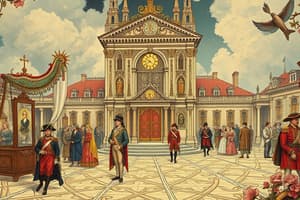Podcast
Questions and Answers
Where was Napoleon born?
Where was Napoleon born?
- Vienna, Austria
- Ajaccio, Corsica (correct)
- Paris, France
- Rome, Italy
What was Napoleon's rank when he graduated from École Militaire in 1785?
What was Napoleon's rank when he graduated from École Militaire in 1785?
- Second Lieutenant (correct)
- Captain
- Lieutenant
- General
What event marked the beginning of the Napoleonic Empire?
What event marked the beginning of the Napoleonic Empire?
- Coup d'état in 1799
- Battle of Waterloo
- Declaration of Emperor of France in 1804 (correct)
- French Revolution
Which of the following was NOT one of Napoleon's military campaigns?
Which of the following was NOT one of Napoleon's military campaigns?
What was one of Napoleon's significant domestic reforms?
What was one of Napoleon's significant domestic reforms?
Where was Napoleon exiled after his final defeat in 1815?
Where was Napoleon exiled after his final defeat in 1815?
What was the name given to Napoleon's brief return to power in 1815?
What was the name given to Napoleon's brief return to power in 1815?
What is Napoleon remembered as?
What is Napoleon remembered as?
Flashcards are hidden until you start studying
Study Notes
Early Life
- Born on August 15, 1769, in Ajaccio, Corsica
- Family was of minor Corsican nobility
- Attended École Militaire in Paris, graduating in 1785
- Commissioned as a second lieutenant in the French army
Rise to Power
- Supported the French Revolution and gained popularity among the military and civilians
- Became a general in 1793 and led successful campaigns in Italy and Egypt
- Returned to Paris and seized power in a coup d'état in 1799, becoming First Consul of France
- Declared Emperor of France in 1804, marking the beginning of the Napoleonic Empire
Military Campaigns
- Conquered much of Europe, including Italy, Germany, and Austria
- Defeated several European coalitions, including the Prussian and Russian armies
- Invaded Russia in 1812, but suffered a disastrous defeat, leading to a decline in his power
Domestic Reforms
- Implemented the Napoleonic Code, a comprehensive and modernized legal system
- Established the Banque de France, the central bank of France
- Reorganized the French education system, creating the École Normale Supérieure and the Lycée system
Downfall and Exile
- Forced to abdicate the throne in 1814 and exiled to Elba
- Escaped from Elba and regained power for a brief period, known as the Hundred Days
- Defeated at the Battle of Waterloo in 1815 and exiled again, this time to Saint Helena, where he died in 1821
Legacy
- Remembered as a brilliant military strategist and tactician
- Implemented reforms that modernized and centralized France
- Left a lasting impact on European history, politics, and culture
Early Life
- Napoleon Bonaparte was born on August 15, 1769, in Ajaccio, Corsica, to a family of minor Corsican nobility.
- He attended the École Militaire in Paris, graduating in 1785, and was commissioned as a second lieutenant in the French army.
Rise to Power
- Napoleon supported the French Revolution, which gained him popularity among the military and civilians.
- He became a general in 1793 and led successful campaigns in Italy and Egypt, further increasing his influence.
- In 1799, Napoleon returned to Paris and seized power in a coup d'état, becoming First Consul of France.
- He declared himself Emperor of France in 1804, marking the beginning of the Napoleonic Empire.
Military Campaigns
- Napoleon conquered much of Europe, including Italy, Germany, and Austria, through a series of successful military campaigns.
- He defeated several European coalitions, including the Prussian and Russian armies.
- In 1812, Napoleon invaded Russia, but suffered a disastrous defeat, leading to a decline in his power.
Domestic Reforms
- Napoleon implemented the Napoleonic Code, a comprehensive and modernized legal system that simplified laws and maintained social order.
- He established the Banque de France, the central bank of France, to stabilize the economy.
- Napoleon reorganized the French education system, creating the École Normale Supérieure and the Lycée system, which ensured a more efficient and uniform education.
Downfall and Exile
- Napoleon was forced to abdicate the throne in 1814 and exiled to Elba.
- He escaped from Elba and regained power for a brief period, known as the Hundred Days, but was defeated at the Battle of Waterloo in 1815.
- Napoleon was exiled again, this time to Saint Helena, where he died on May 5, 1821.
Legacy
- Napoleon is remembered as a brilliant military strategist and tactician.
- He implemented reforms that modernized and centralized France, leaving a lasting impact on European history, politics, and culture.
- Napoleon's legacy extends beyond his military conquests, with his reforms shaping the development of France and Europe.
Studying That Suits You
Use AI to generate personalized quizzes and flashcards to suit your learning preferences.




